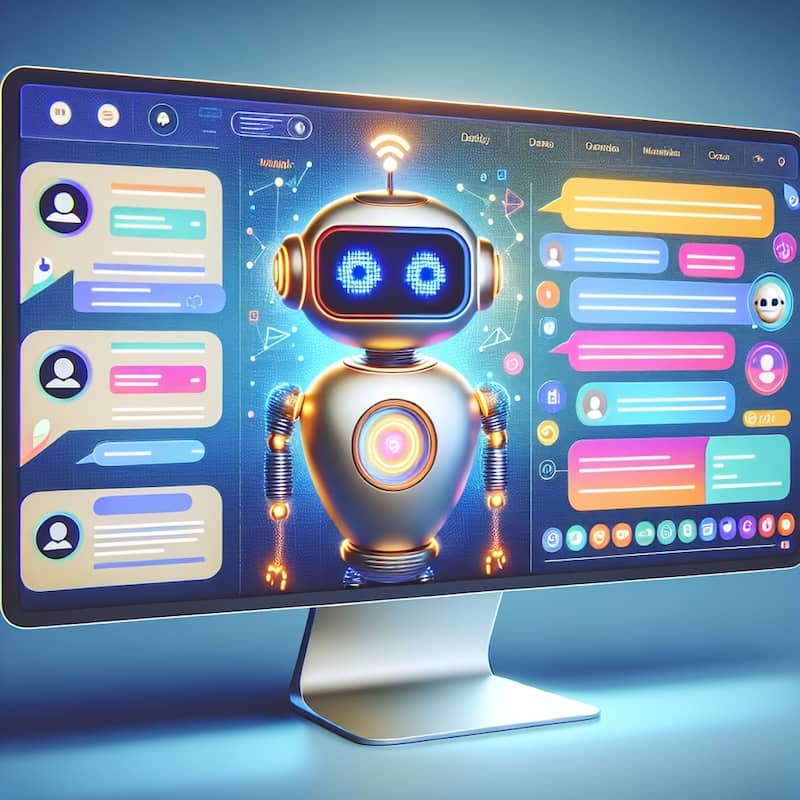
gusnatø
- February 13, 2025
- AI Summary
In the digital age, businesses constantly seek innovative ways to enhance their operations. One such innovation that’s making waves is the AI chatbot.
AI chatbots, using machine learning and natural language processing technologies, are changing customer service and lead generation. They’re not just automated response systems. They’re intelligent virtual assistants capable of understanding and responding to user queries in a natural, conversational manner.
AI chatbots, also known as AI chatbot agents, offer a promising solution for business owners struggling with inefficient operations and poor customer service. They can handle multiple customer inquiries simultaneously, provide 24/7 support, and even offer personalized assistance based on user data.
Marketing managers, too, can benefit from integrating AI chatbots into their strategies. Virtual assistants can make lead generation easier. They can check the quality of leads and send them to the right sales channels. This helps to boost conversion rates.
But the potential of AI chatbots extends beyond customer service and marketing. They can be integrated into various business systems and workflows, enhancing overall efficiency and cost-effectiveness.
In this article, we’ll delve into the transformative potential of AI chatbots in business. We’ll explore their capabilities, their role in customer service and lead generation, and how they can be integrated into business operations. We’ll also look at the future trends in AI chatbot development and how businesses can overcome the challenges and limitations of this technology.
Understanding Their Capabilities
AI chatbots have emerged as pivotal tools in modern business. Their capabilities extend far beyond simple task automation.
Today’s AI chatbots leverage technologies like machine learning (ML) and natural language processing (NLP). These advancements allow them to understand and interpret user intent more accurately.
Their ability to engage in lifelike dialogues makes them indispensable in customer service. These chatbots can handle routine inquiries, troubleshoot issues, and even provide personalized recommendations.
But their usefulness isn’t limited to customer interaction. AI chatbots can also gather valuable customer data and insights. This data can be used to refine marketing strategies and improve product offerings.
Key capabilities of AI chatbots include:
- 24/7 availability for customer interaction
- Automation of repetitive tasks for operational efficiency
- Data collection and analysis for insight generation
- Engagement in natural dialogues using conversational AI
AI chatbots can seamlessly integrate with other business systems. This helps streamline processes and enhance operational efficiency. By doing so, they reduce costs traditionally associated with customer service personnel.
In the following sections, we’ll delve deeper into their evolution and the pivotal role of conversational AI. These insights will underline why AI chatbots are integral to future business success.
The Evolution of Chatbots to AI Chatbots
The journey from traditional chatbots to advanced AI chatbots has been transformative. Initially, chatbots were simple rule-based systems. They followed pre-set instructions to respond to user queries.
However, these early chatbots had limitations. They struggled with understanding context and handling complex queries. This often led to user frustration.
With advancements in AI, modern chatbots have evolved into intelligent systems. They utilize natural language processing (NLP) and machine learning (ML). This enables them to understand context and deliver personalized responses.
This evolution has transformed chatbots from mere response systems to sophisticated virtual assistants. They now play a central role in automating and enhancing business-customer interactions.
Conversational AI: The Heart of Modern Chatbots
Conversational AI is the technology that powers modern chatbots. It enables chatbots to communicate like humans, creating engaging dialogues.
AI chatbots use natural language understanding (NLU) to grasp user intent. This allows them to provide relevant and accurate responses.
One of the key features of conversational AI is its ability to learn from interactions. As chatbots gather more data, they become smarter and more efficient.
This technology is particularly beneficial in improving user experience. It ensures that customers feel understood and valued.
In essence, conversational AI is what makes AI chatbots more human-like. It’s the driving force behind their ability to manage intricate conversations effectively. Through continuous learning, these systems are evolving to meet ever-changing user expectations.
The Role of AI in Customer Service Excellence
AI chatbots are revolutionizing customer service. They offer fast, efficient, and consistent interactions, enhancing the customer experience significantly.

By automating routine tasks, businesses can focus on complex issues that require human intervention. This balances efficiency with the human touch.
Key benefits of AI chatbots in customer service include:
- 24/7 availability: Providing support at any time
- Instant response: Reducing wait times for customers
- Consistency: Ensuring uniformity in handling queries
- Scalability: Capable of managing numerous inquiries simultaneously
AI chatbots can seamlessly integrate with CRM systems. This helps them personalize interactions based on customer data, increasing satisfaction.
Moreover, they can identify common issues and provide instant solutions, reducing the need for escalation. This proactive approach boosts customer satisfaction.
Case studies have shown a reduction in operational costs when using AI chatbots. Businesses can achieve significant savings while maintaining high service standards.
Overall, AI chatbots contribute to customer retention by providing a seamless, engaging experience. This enhances brand loyalty and long-term value.
Automating Customer Interactions with AI
AI chatbots excel in automating routine customer interactions. Tasks such as answering FAQs, booking appointments, and tracking orders can be done effortlessly.
Automation leads to immediate responses, keeping customers engaged and satisfied. It also frees human agents to focus on complex issues, enhancing service quality.
Furthermore, AI chatbots can manage multiple conversations at once, ensuring no customer is left waiting. This capability is crucial for maintaining high service levels during peak times.
Automation not only improves efficiency but also scales customer service operations. This scalability is essential for growing businesses that experience fluctuating inquiry volumes.
Enhancing Customer Satisfaction and Retention
AI chatbots play a pivotal role in enhancing customer satisfaction. They provide instant assistance, reducing frustration caused by long wait times.
Personalization is key to customer retention. AI chatbots can tailor responses based on previous interactions and preferences. This leads to more meaningful engagements.
Moreover, AI chatbots gather valuable feedback, helping businesses understand and address customer needs. Insights from these interactions can lead to service improvements.
AI chatbots help build trust by providing consistent and reliable support. Customers appreciate it when a brand understands and meets their needs effectively.
Ultimately, high satisfaction levels foster loyalty, encouraging customers to return. This is vital for businesses focused on retaining their existing customer base.

AI in Lead Generation and Sales
AI chatbots are transforming lead generation and sales processes. They provide innovative ways to engage prospects and convert leads into customers.
These chatbots can interact with potential leads effortlessly. By analyzing user behavior, they can identify potential interests and tailor interactions accordingly.
AI chatbots assist in segmenting leads based on predefined criteria. This ensures that marketing efforts are focused where they are most likely to succeed.
- Lead capturing: Collecting information from new users
- Engagement: Initiating conversations with personalized messages
- Qualification: Scoring leads based on their responses
- Follow-ups: Scheduling reminders for human sales teams
Through intelligent conversation pathways, AI chatbots qualify leads efficiently. They determine the intent and prioritize leads for the sales team.
Moreover, the data collected by AI chatbots is invaluable. Insights gained can refine marketing strategies, optimizing the sales funnel.
Businesses that employ AI chatbots see improved conversion rates. The immediate, personalized responses keep potential customers engaged and interested.
Streamlining Lead Qualification and Conversion
AI chatbots streamline the lead qualification process by using natural language processing (NLP). They engage in meaningful dialogues to assess lead interest and suitability.
Chatbots gather crucial information by asking targeted questions. This speeds up the qualification process, allowing sales teams to focus on high-potential leads.
AI chatbots are unparalleled in their efficiency in qualifying leads. They work tirelessly, evaluating each interaction against predefined criteria for faster decision-making.
AI chatbots’ data-driven approach ensures that no lead falls through the cracks. They maintain consistent engagement and nurture leads until they are sales-ready.
Chatbots also automate follow-up messages. This persistent engagement prevents cold leads, keeping prospects warm until human contact is necessary.
Personalized Recommendations and Sales Assistance
AI chatbots excel at providing personalized recommendations. Using data from customer interactions, they suggest products and services tailored to individual preferences.
AI chatbots leverage customer data to create a curated shopping experience. This personalization enhances customer engagement and encourages purchases.
Chatbots assist in upselling and cross-selling by presenting relevant options. Their recommendations are based on previous purchases and user interests.
Moreover, AI chatbots provide real-time assistance for product inquiries. They can guide customers through purchasing decisions and answering queries instantly.
This level of personalized service significantly impacts sales. Customers feel understood and valued, which positively influences buying decisions.
In conclusion, AI chatbots are indispensable in modern sales strategies. Their ability to provide tailored recommendations elevates the customer experience and drives sales growth.
Integrating AI Chatbots into Business Operations
Integrating AI chatbots into business operations can revolutionize efficiency. These chatbots seamlessly fit into existing workflows, enhancing productivity.

Businesses benefit from AI chatbots by automating routine tasks. This frees up staff to focus on more complex and strategic activities.
AI chatbots can integrate with various business systems. Whether it’s CRM, ERP, or other platforms, they offer versatile solutions tailored to different needs.
Here are key integration benefits:
- Improved Efficiency: Automates repetitive tasks, reducing manual effort
- Data Insights: Collects and analyzes customer interactions
- Scalability: Grows with business needs without additional resources
- Cost Reduction: Lowers operation costs by minimizing the need for extra manpower
Moreover, AI chatbots ensure consistent customer interaction. They provide uniform responses, maintaining brand voice across all touchpoints.
Integration with AI chatbots also strengthens data management. Businesses gain valuable insights, leading to informed decision-making and strategic planning.
The ease of chatbot integration means they can be quickly deployed. This rapid implementation brings immediate improvements in service delivery.
Case Studies: Successful AI Chatbot Implementations
Leading companies have demonstrated successful AI chatbot integration. These case studies showcase tangible benefits across different industries.
Take the retail giant, for instance. By integrating AI chatbots, they enhanced customer service efficiency, leading to a notable increase in satisfaction scores.
In another example, a financial institution used AI chatbots for customer inquiries. This not only improved response times but also freed personnel to handle complex tasks.
Similarly, a healthcare provider adopted AI chatbots for appointment scheduling. Patients booked appointments easily, and staff time was optimized.
These case studies highlight the diverse applications of AI chatbots. Each instance illustrates significant gains in customer engagement and operational efficiency.
Best Practices for AI Chatbot Integration
For successful chatbot implementation, follow key best practices. These ensure seamless integration and maximum benefit from AI technology.
First, clearly define the goals of chatbot integration. Understand what issues the AI chatbot should address and set measurable outcomes.
Second, prioritize user experience. Create a friendly, intuitive interface for ease of interaction, ensuring customers find conversations natural and satisfying.
Another essential practice is ensuring robust training data for AI algorithms. Quality data empowers AI chatbots to deliver accurate, relevant responses.
In addition, continuously monitor and refine chatbot performance. Use analytics to identify trends and areas for improvement, adapting strategies as needed.
Collaborating with experienced chatbot developers is crucial. Professional insights ensure that the AI chatbot aligns with business objectives and best practice standards.
By adopting these practices, businesses can unlock the full potential of AI chatbots, driving operational success and customer satisfaction.
The Future of AI Chatbots: Trends and Innovations
The future of AI chatbots holds remarkable potential. As technology evolves, chatbots become even more sophisticated and impactful.

Several emerging trends are shaping chatbot innovation:
- Emotional Intelligence: Capable of understanding and responding to human emotions.
- Multilingual Support: Addressing global audiences with seamless language capabilities.
- Voice Integration: Combining conversational AI with voice recognition for hands-free interaction.
The integration of machine learning enhances chatbots, allowing them to learn from past interactions. This leads to improved personalization and user satisfaction.
AI will increasingly use big data analytics. This enables businesses to tailor interactions based on deeper insights into customer behavior and preferences.
Another exciting development is the incorporation of natural language processing advancements. This allows chatbots to comprehend more complex queries, making interactions seamless and intuitive.
These trends highlight the strategic role of chatbots in enhancing customer experience and driving innovation. The continued evolution of chatbot technology promises transformative business solutions.
Advancements in AI Chatbot Technologies
Recent advancements in AI technology have propelled chatbots to new heights. They are now more intelligent and versatile than ever before.
AI is increasingly harnessing deep learning techniques. This enables them to process information similarly to the human brain, improving comprehension and response capabilities.
Improved natural language processing algorithms are making interactions more fluid. Chatbots can now understand nuances in human language, leading to more natural conversations.
Additionally, AI chatbots are beginning to anticipate user needs. By analyzing past behavior, these chatbots can proactively offer relevant suggestions and solutions.
These advancements are revolutionizing how businesses interact with customers. As AI technologies continue to develop, chatbots will provide even more value, efficiency, and engagement.
Ethical Considerations and Continuous Improvement
Implementing AI chatbots requires careful ethical considerations. Businesses must ensure transparency and fairness in how these technologies are used.
A crucial aspect is data privacy. Companies need to protect user data collected by chatbots, adhering to strict privacy regulations and maintaining user trust.
Continuous improvement is vital for ethical chatbot deployment. Regular updates and refinements help address biases and inaccuracies in chatbot interactions.
Furthermore, maintaining a balance between automation and human intervention is key. While AI chatbots can handle numerous tasks, human oversight remains essential for quality assurance.
Emphasizing ethical practices in AI chatbot use not only enhances public trust but also strengthens the technology’s long-term impact. By aligning with ethical guidelines, businesses can ensure responsible and effective chatbot integration.
Overcoming Challenges and Limitations
AI chatbots offer numerous benefits, but they also come with challenges. Businesses must address these to harness chatbots’ full potential.
A common limitation is chatbots’ inability to handle very complex queries. This can lead to user frustration if not properly managed.
Integration with legacy systems can present technical hurdles. Ensuring seamless connectivity is crucial for maximizing chatbot efficiency.
Chatbots must also evolve continuously to stay relevant. Regular updates are needed to enhance functionality and address user feedback.
Finally, there’s the challenge of maintaining high levels of accuracy. Misinterpretations can occur, and reducing these is essential for ensuring reliability.
Ensuring Data Security and User Privacy
Protecting data is critical in chatbot interactions. Businesses need to implement robust security measures to safeguard user information.
Data encryption and secure access protocols are vital. These efforts minimize the risk of breaches and enhance user confidence.
Adhering to data privacy regulations is crucial. Businesses must respect user consent and preferences, maintaining transparency in data handling.
Maintaining the Human Touch in AI Interactions
While automation offers efficiency, it should not replace human empathy. Striking a balance is key to effective chatbot engagement.
Empathetic responses enhance user satisfaction. AI chatbots should be designed to emulate human-like interaction for a warmer experience.
Additionally, it is important to offer seamless transitions to human agents when needed. This ensures complex issues get the right level of attention.
By carefully blending technology with human insight, businesses can create enriching experiences that resonate with users.
Conclusion: Embracing AI Chatbots for Business Growth
AI is transforming how businesses operate. They enhance customer service and streamline lead generation efficiently.
Integrating AI chatbots can significantly improve business operations. By embracing these tools, businesses position themselves for growth and competitive advantage.
AI technology is evolving rapidly. Now is the perfect time for businesses to adopt chatbots and harness their full potential.







